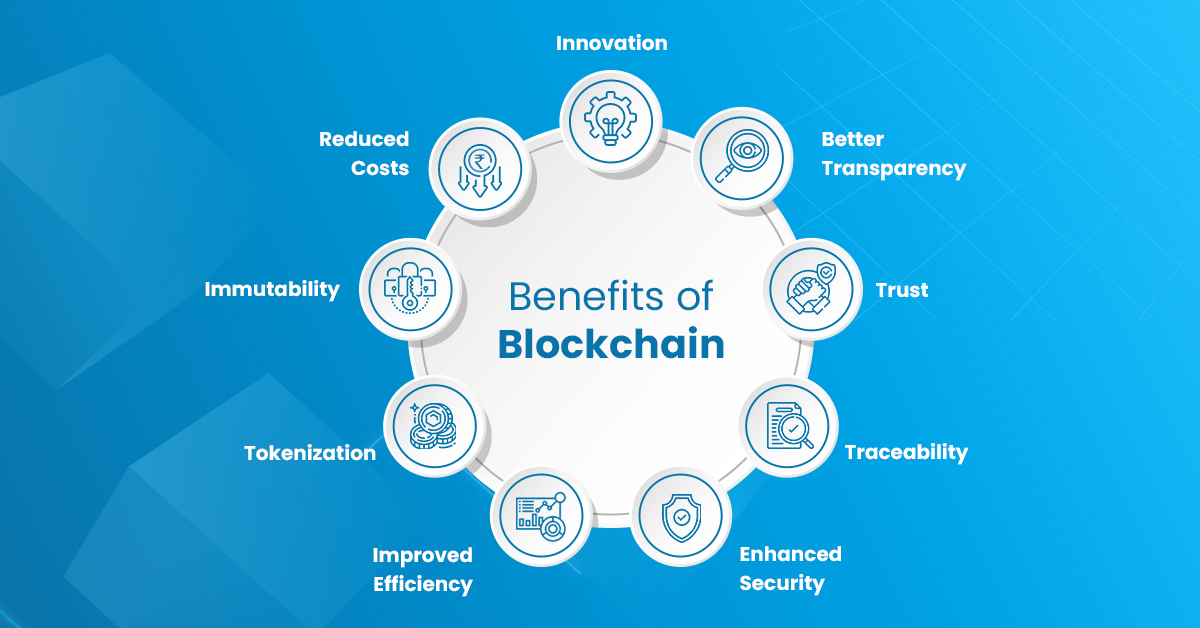One of the biggest benefits of the blockchain technology is that it’s a cost-effective way to do business. This is especially true for small businesses and entrepreneurs. By using this technology, you can avoid having to spend hundreds of thousands of dollars on credit card payments and other payments. It’s also a secure way to store your assets, so you won’t have to worry about fraud or theft. In fact, you can even use it to track the movements of your goods, allowing you to ensure that they arrive on time and are in good condition.
Also Read: report core scientific riot blockchain 215m
Benefits of Blockchain Technology For Small businesses
Using blockchain technology for small businesses can be a game changer. It can improve business efficiency and speed up workflows. Moreover, it can cultivate trust among the participants in transactions. The technology also ensures a secure and traceable transaction process.
One of the most common ways for small businesses to interact with the technology is through the use of non-fungible tokens. Non-fungible tokens (NFTs) are digital cryptographic assets that are unique representations of assets.
NFTs have grown rapidly over the past few years. Currently, they are linked to both physical and digital assets. However, they can also be used for other practical applications.
Another benefit of using blockchain technology for small businesses is the ability to create “smart contracts.” Smart contracts are self-enforcing and can be applied to commercial leases, employee contracts, and vendor agreements.
For the most part, these types of agreements will be stored in a digital ledger called a blockchain. This means that they cannot be tampered with and can be easily verified.
Besides these benefits, blockchain has other features that can be beneficial to small businesses. These include a network of like-minded individuals and a new set of opportunities for growth and expansion.
One of the most intriguing aspects of using blockchain for small businesses is that it can be implemented without a central point of failure. Unlike other technologies, it is a decentralized system that is unable to be corrupted.
Another advantage of using the technology is that it is available to almost anyone. All transactions are mathematically verifiable and can be tracked in real-time. Furthermore, there are no intermediaries between buyers and sellers, and all information is public.
Government
Whether it’s the creation of a decentralized currency or tracking human trafficking, blockchain technology is being used to improve government services. While there is still a lot of work to be done, a number of governments are experimenting with blockchain.
In addition to its potential to enhance public services, the use of blockchain can also help ensure data security. Blockchain is immutable, so there are no single points of failure. This can be important for governments that deal with sensitive data.
Blockchain can also reduce the amount of paperwork required to perform government transactions. It can help streamline the procurement process. Currently, many governments are using a cumbersome system of middlemen, which can increase costs and lead to delays. By cutting out middlemen, organizations can save millions of dollars in fees.
Some of the most impactful applications of blockchain include financial oversight, security, and voting. These services can streamline processes and reduce the likelihood of corruption or disintermediation.
Smart contracts are another application of blockchain that has potential to improve government efficiency. Governments can set contract parameters in real time, thereby reducing the need for intermediaries. Moreover, since transactions are recorded in the same order, it’s possible to ensure that data is tamper-proof.
Another way that blockchain can improve government is through a permanent audit trail. If one of your organizations is in the process of approving a patent, for instance, you can make sure the applicant is qualified by creating a tamper-proof time stamp.
While not all of the benefits of blockchain are applicable to all governments, there are a few things that every government should know about it.
Health care
Among the many healthcare benefits of blockchain technology is its ability to enhance traceability. This can prevent counterfeit drugs from entering the market and improve supply chain management. In addition, it can make clinical trials more transparent and accountable.
Blockchain can also help solve healthcare data privacy concerns. It can verify the authenticity of a document and ensure that data is only accessible to those who are authorized to access it. For example, smart contracts can be used to manage access control and speed up dispute resolutions.
The potential of blockchain in the health care sector is huge. Some companies are already using it to address several key issues.
Most medical data is stored in silos. It’s difficult to measure the quality of management. A smooth data exchange between providers can reduce the costs and help in more efficient therapies.
As blockchain applications are still in their early stages, it’s important for organizations to do further research before investing in them. They can be useful for managing insurance and integrating data based on defined patient-provider relationships.
Healthcare organizations have collaborated with IBM and banking institutions to create a governance framework for using blockchain in healthcare. These organizations include Sentara Healthcare, Cleveland Clinic, and Aetna.
One of the most popular uses of blockchain in the health care industry is its ability to manage consent. Patients can provide their permission to share their medical records with others, and other healthcare providers can only access those records with their consent.
Another use of blockchain in the health care industry is the ability to secure and certify the integrity of medicinal products. It also provides a secure way to store clinical trial documents.
Education
Blockchain technology has many potential benefits in the education sector. Using the tech can improve learning and streamline verification procedures. However, there are a few challenges to implementing this technology, including security and adoption rate.
One of the most interesting advantages of blockchain is its ability to store a complete record of an educational activity. With this technology, you can track every detail, from a student’s attendance to a teacher’s teaching performance.
Another advantage of the technology is its ability to securely share resources. This allows schools to publish openly and make it easy for students to access those resources. Using this technology can improve the quality of online education. Therefore, you find a course increasingly incorporating various technological tools and resources to enhance student learning and engagement. It makes them a convenient and effective option for individuals looking to further their education.
A more practical use of the technology is to provide a secure and efficient way for students to take exams. Teachers can also program their lessons into the chain. By tracing the steps of their students’ learning, the teachers can more accurately evaluate the students’ progress.
Despite the technology’s potential, there have been few research studies to date on the impact of blockchain on education. The American Council on Education (ACE) has created an Education Blockchain Initiative to study the applications of the technology. It has recently awarded $900,000 in grants to organizations that explore the uses of blockchain in education.
Currently, there are a number of companies, governments, and academic institutions that are experimenting with the technology. These include ODEM, which is a decentralized marketplace for educational products. ODEM also has a ledger that recognizes courses taken by students. Besides, the ledger boosts the reputations of both students and professors.
Other applications of the technology include digital diplomas and immutable record keeping. Digital diplomas are easier to verify and offer added security.
Tokenization
Tokenization is a process by which a company, asset, or other piece of intellectual property can be issued as a digital token. This allows people to buy and sell the underlying assets without the involvement of a third party. The value of the token is determined by the nature of the asset.
It also opens the door for new investment models. For example, real estate tokenization can enable small investors to participate in the market while leveraging the high returns that property owners have already secured.
In addition, the immutability of data stored on a blockchain ensures that no one can erase the history of the token. This prevents theft of the token. And with the use of smart contracts, it can be easier and quicker to process a transaction.
Tokenization of assets is a cost-effective way to diversify your portfolio. It democratizes investing and offers a wide audience of potential buyers. As more investors participate, the liquidity of the underlying assets increases.
Tokenization technology can be used with sensitive data of all kinds, from criminal records to voter registration. A key benefit of the technology is that it can be integrated with legacy systems.
Depending on the type of asset, the legal hurdles may be different. For example, tokenization of intellectual property requires the use of the right security measures.
While it is important to consider the legal aspects of the process, the main benefit of tokenization is its ability to increase the liquidity of traditionally illiquid assets. That is, it can lower the lock-up periods and allow investors to sell their assets sooner.


